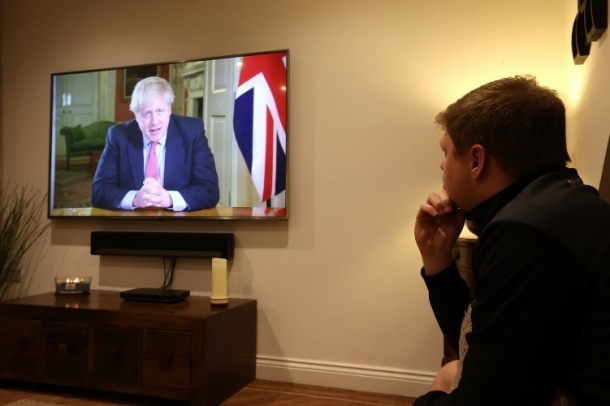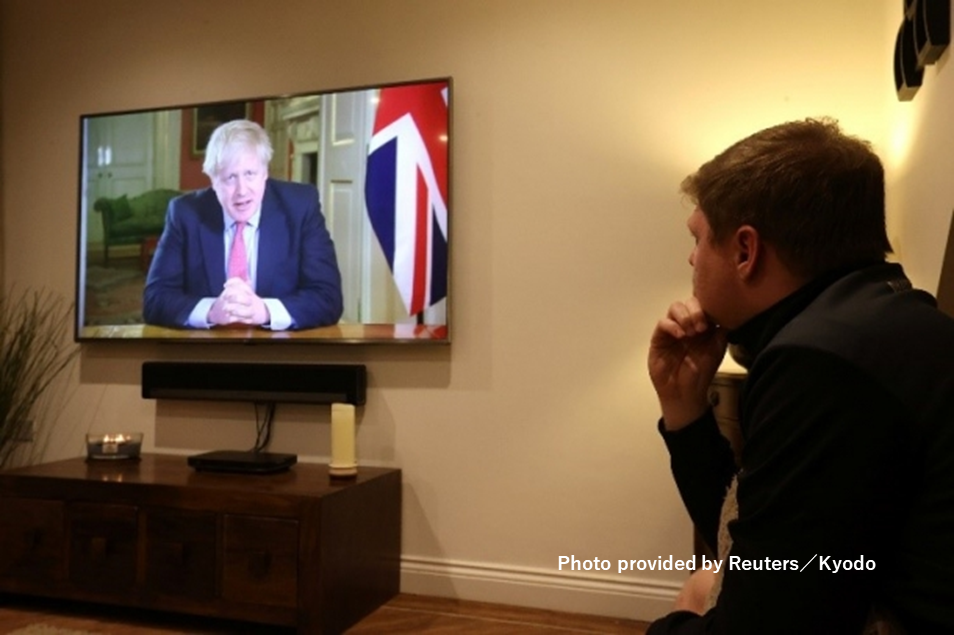Coming Home From The United Kingdom Under Covid-19
Fri, Oct 30, 2020-
Tags
Coming Home From The United Kingdom Under Covid-19

Professor Takaharu Kohara
Waseda University Faculty of Political Science & Economics
From April 2019 to March 2020, thanks to the understanding and cooperation from my workplace, I was able to spend a sabbatical at the University of Edinburgh in Scotland and focus on research there. Twenty years after the devolution reforms by the Labour administration of Tony Blair, I had originally intended to focus on examining their outcome and exploring future prospects, but ended up spending most of my time following Brexit, Britain’s withdrawal from the European Union, and the general election called to decide its fate. After the UK left the EU on February 1 2020, the novel coronavirus began spreading mainly in urban areas, giving me a chance to undergo rare experiences right through my departure.
This piece will be a brief analysis of these experiences and the characteristics of the UK government’s response to the Covid-19 outbreak. I will not make a direct comparison between the UK’s measures and those of Japan, but it will be clear from the discussion that the differences are not small.
Sudden Outbreak and Sudden Policy Changes
When Covid-19 began to spread rapidly in mid-March, the UK government made an abrupt shift from a wait-and-see stance to a set of stringent containment measures. The change was marked by Conservative Prime Minister Boris Johnson’s speech addressing the nation, which was aired on a BBC special program from 8:30 pm on March 23 (see Photo 1).
“I urge you at this moment of national emergency to stay at home, protect our NHS(National Health Service) and save lives.”

Photo 1
Photo provided by Reuters/Kyodo
It was clear that most social/economic activity would be brought to a halt. As we were about to return home, we faced a different kind of emergency on top of the Covid-19 crisis. Watching the prime minister’s speech on TV, I sighed at the thought that we might not be able to leave the country before our visas expired on April 2.
While countries were closing their borders to foreigners and airlines were reducing flights, how were we to reschedule our return flight? How were we to dispose of household items and arrange transport of our belongings? The biggest worry was our car; the dealer canceled an appointment with us to discuss the car’s sale just hours before the prime minister’s speech, and told us all dealerships would be closed for an indefinite period.
Ultimately, these issues were resolved thanks to kind advice from the Japanese consulate in Edinburgh, but not without many moments of us looking up to the heavens in despair.
UK Government’s Covid Measures
The UK government’s Covid-19 control measures are based on two interrelated policy pillars: 1) a strict lockdown, that is, restrictions on mobility and business operations; and 2) generous compensation for resulting losses.
The second pillar comprises ⓐ the job retention/furlough scheme, and ⓑ the self-employment income support scheme. Both schemes provide roughly the same level of compensation for wage earners and self-employed people: 80% of their monthly incomes, capped at £2500. The provision began in March and continues until October, with compensation rates and upper limits ramped down in stages.
The self-employed scheme (ⓑ) was set up along with the wage-earner scheme (ⓐ) in view of the expansion of non-regular employment known as the gig economy in the UK. The number of quasi-independent workers, for example, those in delivery work, for-hire driving and other jobs, with unstable incomes is rapidly growing (see Figure 1). The latest film by social critic director Ken Loach, “Sorry We Missed You,” depicts this trend and its impact on society, providing valuable clues to understanding UK society today. I highly recommend this film.

Figure 1
BBC (https://www.bbc.com/news/business-52052123)
As a whole, the Johnson administration’s Covid-19 response seems to be including some social-democratic features despite it being a conservative government, such as prioritizing employment and income support. Also, combining lockdowns with compensation is a standard European-style policy taken by key EU members. The hard-line Brexiter Johnson’s walking in step with the EU countries appears to be quite an irony. He may well have acted to avoid any “I told you so” criticism from anti-Brexiters.
“There really is such a thing as society”
Finally, I will cite an episode which became well-known in connection with the above mentioned policy shift by Johnson.
Prime Minister Johnson himself caught Covid-19 in late March and published a self-shot video message from self-quarantine. In it, after expressing appreciation for the public following the strict lockdown rules and doctors and nurses working for National Health Service, he said “One thing I think the coronavirus crisis has already proved is that there really is such a thing as society.” (*1) The part about society is a clear reference to a famous quote by Margaret Thatcher, the former Conservative Party head, prime minister and neoliberalism standard-bearer.
In a magazine interview as prime minister in 1987, Thatcher said:
“…so they are casting their problems on society and who is society?…There are individual men and women and there are families and no government can do anything except through people and people look to themselves first.” “There is no such thing as society.” (*2)
Of course, it is the Conservative government that has expanded non-regular employment and pursued other neoliberal policies in the UK for the last decade, and it would be naive to suggest that Prime Minister Johnson, at the center of the Conservative Party, has had a fundamental change of heart. Still, It is evident that the Johnson administration has drifted far away from the neoliberal principles in its response to the pandemic. And by what is called “path dependency” in political science, this shift will surely affect the direction of its policy-making going forward.
Notes:*
- https://www.theguardian.com/politics/2020/mar/29/20000-nhs-staff-return-to-service-johnson-says-from-coronavirus-isolation
- https://www.margaretthatcher.org/document/106689
Author’s Profile

Born 1959 in Nagano Prefecture, Takaharu Kohara graduated from Waseda University School of Political Science & Economics in 1982 and completed coursework at the Graduate School of Political Science in 1990. He was Professor at Seikei University before assuming his current position in 2010. His specialty is local government. His major publications include: Critical Review of the Great Heisei Consolidation (Commons, 2003; Editor/Coauthor); Great Heisei Consolidation and Inter-Municipal Cooperation (Kojin-sha, 2007; Coeditor/Coauthor); New Public and Local Government (Commons, 2011; Coeditor); and Social Sciences in the Wake of the Great East Japan Earthquake vol.2: Local Governance after the Disaster (Toyokeizai-shinposha, 2015; Coeditor).














